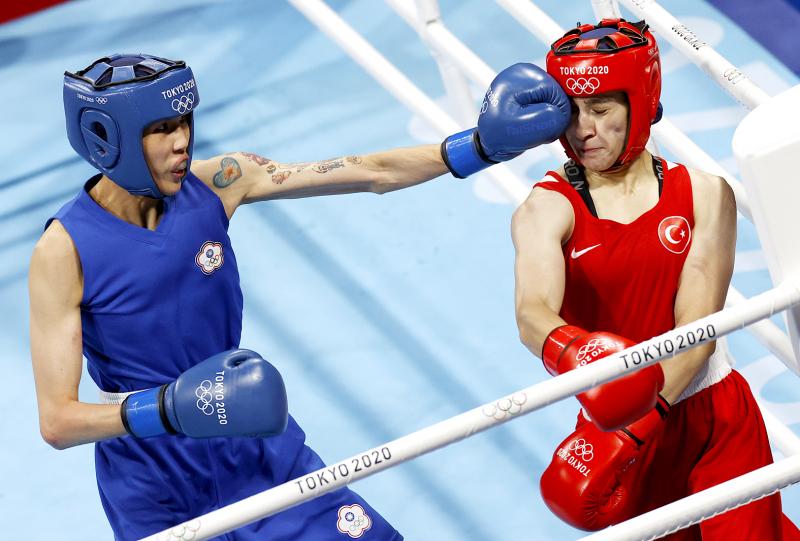Taiwanese boxer Huang Hsiao-wen (黃筱雯) yesterday won bronze in the flyweight category at the Tokyo Olympics, the first medal Taiwan has ever won in the sport, after falling to world No. 2 Buse Naz Cakiroglu of Turkey in the semi-finals.
Huang, who is competing at the Olympics for the first time, lost 0-5 to Cakiroglu.
Despite the defeat, she won a medal because athletes who are defeated in a boxing semi-final at the Olympics are all awarded bronzes, unlike other Olympic sports in which losing semi-finalists vie for a single medal.

Photo: EPA-EFE
European champion Cakiroglu saw off the 1.76m Huang with a high-tempo, tactical performance, ducking Huang’s long jabs repeatedly before moving in swiftly on the counter.
Huang was visibly emotional after the bout, telling reporters how much the medal means to her and that she feels “extremely honored.”
Huang was outscored in all three rounds.
“I was too nervous,” Huang said. “Even though [Cakiroglu] is shorter, she exuded more confidence.”
Huang’s coach, Liu Tsung-tai (劉宗泰), said that his charge was not able to control her speed as well as her opponent, but he was still proud of her performance at her first Summer Games.
It has been tough for Huang to maintain her competition weight of 48kg to 51kg and he wants her to have some time off after returning to Taiwan, Liu said.
“And then we’ll start over,” he added.
Huang began crying again on hearing Liu’s words, saying that the medal is meaningful to her, being a first for Taiwan.
“I feel extremely honored to be able to bring this glory to Taiwan,” she said.
Cakiroglu is to fight 35-year-old Stoyka Zhelyazkova Krasteva of Bulgaria in Saturday’s flyweight gold medal match after she emerged on top despite a spirited performance by Japan’s Tsukimi Namiki.
“I am so, so happy, but I am trying to stay focused on the final as we came here ... to win the gold medal,” Cakiroglu said. “The mission is not complete yet.”
With Huang’s bronze, Taiwan has won 11 medals at the Tokyo Games — two gold, four silver and five bronze — the nation’s best-ever haul.

CHAOS: Iranians took to the streets playing celebratory music after reports of Khamenei’s death on Saturday, while mourners also gathered in Tehran yesterday Iranian Supreme Leader Ayatollah Ali Khamenei was killed in a major attack on Iran launched by Israel and the US, throwing the future of the Islamic republic into doubt and raising the risk of regional instability. Iranian state television and the state-run IRNA news agency announced the 86-year-old’s death early yesterday. US President Donald Trump said it gave Iranians their “greatest chance” to “take back” their country. The announcements came after a joint US and Israeli aerial bombardment that targeted Iranian military and governmental sites. Trump said the “heavy and pinpoint bombing” would continue through the week or as long

TRUST: The KMT said it respected the US’ timing and considerations, and hoped it would continue to honor its commitments to helping Taiwan bolster its defenses and deterrence US President Donald Trump is delaying a multibillion-dollar arms sale to Taiwan to ensure his visit to Beijing is successful, a New York Times report said. The weapons sales package has stalled in the US Department of State, the report said, citing US officials it did not identify. The White House has told agencies not to push forward ahead of Trump’s meeting with Chinese President Xi Jinping (習近平), it said. The two last month held a phone call to discuss trade and geopolitical flashpoints ahead of the summit. Xi raised the Taiwan issue and urged the US to handle arms sales to

BIG SPENDERS: Foreign investors bought the most Taiwan equities since 2005, signaling confidence that an AI boom would continue to benefit chipmakers Taiwan Semiconductor Manufacturing Co’s (TSMC, 台積電) market capitalization swelled to US$2 trillion for the first time following a 4.25 percent rally in its American depositary receipts (ADR) overnight, putting the world’s biggest contract chipmaker sixth on the list of the world’s biggest companies by market capitalization, just behind Amazon.com Inc. The site CompaniesMarketcap.com ranked TSMC ahead of Saudi Aramco and Meta Platforms Inc. The Taiwanese company’s ADRs on Tuesday surged to US$385.75 on the New York Stock Exchange, as strong demand for artificial intelligence (AI) applications led to chip supply constraints and boost revenue growth to record-breaking levels. Each TSMC ADR represents

Pro-democracy media tycoon Jimmy Lai’s (黎智英) fraud conviction and prison sentence were yesterday overturned by a Hong Kong court, in a surprise legal decision that comes soon after Lai was jailed for 20 years on a separate national security charge. Judges Jeremy Poon (潘兆初), Anthea Pang (彭寶琴) and Derek Pang (彭偉昌) said in the judgement that they allowed the appeal from Lai, and another defendant in the case, to proceed, as a lower court judge had “erred.” “The Court of Appeal gave them leave to appeal against their conviction, allowed their appeals, quashed the convictions and set aside the sentences,” the judges